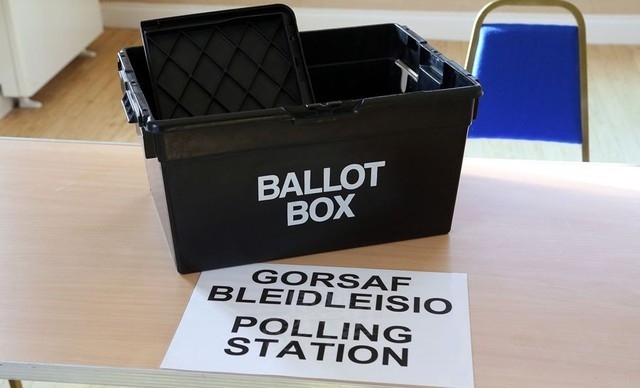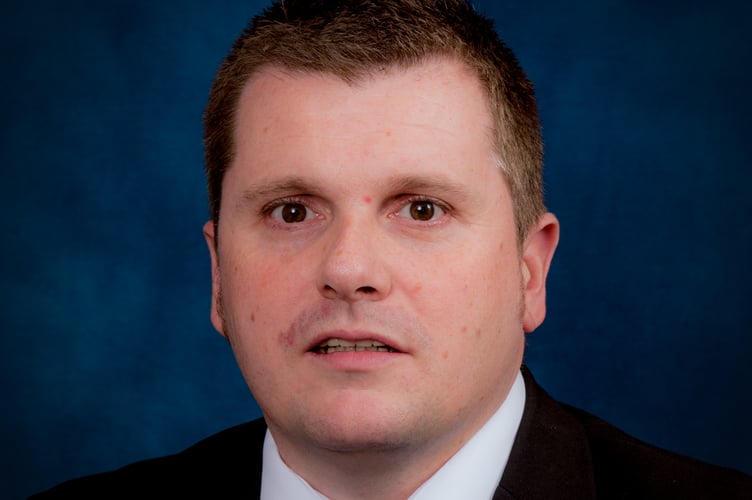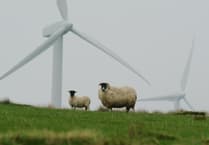Amid rising cost pressures leading to hikes in council tax and cuts in services, there is only so much county councils in mid and north Wales can do without the help of Welsh Government as calls are made for a future-proof, sustainable funding model to be introduced to avoid constant ‘fire-fighting’ at local authority level.
The Welsh Local Government Association (WLGA) unveiled its ‘For a Resilient Wales’ manifesto this month ahead of the 2026 Senedd elections in May.
The Senedd elections will take place in May 2026, with Senedd numbers rising from 60 to 96 under a new voting system, and the WLGA is calling for more co-operation between councils and the incoming Welsh Government in the fight for extra funding for local authorities.
Ceredigion County Council – which has come under fire for successive large council tax increases over the past five years at a time of service cuts and school closures – has regularly called for a funding floor to be introduced by the Welsh Government when doling out cash to run local authorities, with those is urban south Wales more likely to be favoured by any increase than more rural areas including Ceredigion, Gwynedd and Powys.
All three councils received a funding boost below the Wales average of 4.3 per cent for 2025/26 with authority chiefs warning that the funding is simply not enough to support services and head off double digit tax rises for residents.
That was despite a funding floor being introduced, albeit at a lower level than the councils said they required.
Ceredigion County Council said its funding settlement “fell significantly short of the amount required to keeping sustaining the current level of public services” in the county as it received the lowest increase per head of population across all of Wales for the second year running.
A report from Gwynedd council earlier this month warned that “we have now reached a point where we cannot squeeze more of it without cutting services that would have a clear and direct impact on the residents of Gwynedd.”
The report also pointed to “a lack of clarity on behalf of the Government” meaning planning ahead on the basis of the likely settlement is “even more difficult for 2026/27 than usual”.
Gwynedd council also fear Welsh Government could set a “roll-over budget” for 26/27, to continue with this year’s budget with a small addition towards inflation only and “no consideration or recognition towards other significant costs facing local government.”
Powys council warned of more ‘difficult decisions’ to be made to balance its budget and said that the “increase will not be sufficient in meeting the severe pressures the council is currently facing due to increased demand for services, price inflation, provider costs and national pay awards.”
The WLGA made the funding of councils a key theme of its manifesto, calling for a sustainable funding plan for services, including social care, so “that councils can move from “firefighting” pressure points towards long-term planning for the future”.
The WLGA manifesto says that over 70 per cent of local authority budgets are spent on rising social care and education demand and inflationary costs.
“Growth in costs is outstripping available resources, diverting vital funding away from opportunities for place-based and preventative services as councils are forced to firefight instead of planning for the future,” the WLGA said.
“Welsh Councils need an urgent recognition of these pressure points and a long-term fair and sustainable funding plan.
“This is essential if councils are to be empowered to move from firefighting to forward planning for these essential services.”
The WLGA said that it wants to see a “new prevention focus for vital local services” combined with “an honest conversation on the future funding packages required to meet additional demand for social care, education pressures, and Additional Learning Needs provision.”
“Additional funding for social care will have a direct, positive impact on the NHS being able to deliver on its targets and improve health outcomes,” the manifesto says.
“Local and Welsh Government will work together using our new partnership to meet these challenges and move to an enabling environment making greater use of digital and reforming our services.”
The WLGA also called for a “council-led way of working together across regions that’s flexible and focused on saving money, strengthening services, and helping people.”
“Local councils are the closest tier of government to our communities,” the WLGA said.
“Uniquely amongst Welsh public services, we have the ability to work locally, regionally and nationally.
“We want parties and Welsh Councils to co-produce a strategic vision for regional governance, sustainable growth and planning, respecting local democracy and giving councils the tools to collaborate where it improves people’s lives.”
The WLGA said that it wants to see a “commonly agreed, democratically based and flexible regional approach, with additional powers passed down from national to local government, not just powers moved from the local to regional level.”
“Welsh Councils will be empowered to collaborate by choice in any policy area where doing so would build resilience, save money or improve people’s lives,” the manifesto says.
“Regional collaboration will also be supported where it leads to greater efficiencies, and where it unlocks additional funding for investment into our communities.”
Hand-in-hand with funding and regional working, the WLGA said there needs to be a “strengthening of the Partnership Agreement between local and Welsh Government, with fair funding for any new duties.”
“The new Strategic Partnership Agreement sets the framework for constructive and equal collaboration between local and Welsh Government, and we hope this will be respected and honoured in the next Senedd term,” the WLGA said.
“Its principles are broader than any one political party or Senedd term, and should be strengthened and expanded upon over the years to come.
“We want parties to commit to this Partnership Agreement and way of working and utilise it to work closely with local government on the major challenges facing Wales, now and in the future: sustainability of services and resources, local solutions to global challenges, and fair and long-term funding for our councils.”

The WLGA said that there should be “earlier engagement and meaningful co-design between Welsh Councils and Welsh Government to place on new legislation and policy initiatives.”
“When Welsh Councils agree to take on new duties, these will be fairly funded, replacing government imposed burdens with opportunities to deliver,” the manifesto outlines.
“A series of shared outcomes will be agreed and achieved, with Welsh Councils playing a role as enablers and partners.”
Alongside funding, the WLGA calls for a “new prevention focus to tackle ill-health, climate change adaptation, nature recovery, as well as leisure and recreation.”
“An all-encompassing preventative agenda is the only solution to the challenges posed by climate change and flooding, global instability, community cohesion and the unsustainable demands on public services caused by demographic changes, increasing complexity of need, ill-health and poverty,” the association’s manifesto said.
“We call on parties to commit to shifting focus to prevention and early intervention, both in principle and in practice.
“Local services should be seen as enablers of well-being to be developed and expanded, not just protected.”
The new prevention focus will “cover public services as a whole, with a commitment to regularly-reviewed investment in order to create impactful links between local services, community safety, and health and well-being,” the WLGA said.
“Resources will flow to local and regional priorities on tackling ill health, climate change mitigation and adaptation, nature recovery and place-based services that support well-being such as recreation, play and leisure.”
In a bid to modernise and save needed cash for services, the WLGA has also called for “prioritising a digital Wales by fully resourcing a digital strategy for Wales, using data and technology to transform public services.”
“Welsh public services remain under-digitised, even as societies stand on the brink of significant technological change over the next four year Senedd term,” the WLGA said.
“Digital transformation offers an opportunity to increase productivity, improve the services our Councils deliver, and to reverse declining user satisfaction with public services.
“We call on parties to embrace digital as being key to every decision made in Wales.
“Making use of digital, data and technology is an unmissable opportunity that needs a Wales-wide effort, with the next Welsh Government working to remove the resource barriers that stand in the way of transformation.”
The WLGA said that “digital, data and technology will become integral to frontline public service delivery and ongoing service improvement.”
It said that it wanted a “fully resourced national Digital Strategy for Wales” put in place, “empowering councils to achieve the Digital Service Standards, and people and communities will see their expectations for digital-driven services met.”
“Data accessibility and transparency will improve, and Councils will be better equipped to use data to inform our decisions,” the WLGA said.
“All tiers of government will be better positioned to make use of new technologies to carry out their responsibilities to the people of Wales.”
The last of the WLGA themes for the manifesto calls for “new freedoms and flexibilities for Welsh Councils to deliver urban renewal and rural resilience, focusing on the sustainable growth of our communities.”
The WLGA said it wants a “commitment to streamline the plan-making system in Wales so that it reflects a truly equal collaboration between Local and Welsh Government, blending national leadership with local led ambition to make places more sustainable, vibrant, and resilient on their own terms.”
“We want parties to commit to a vision of renewal for our urban communities, and to build resilience for rural Wales, underpinned by a more enabling planning system,” the WLGA said.
The WLGA called for a “shift of emphasis from legislative prescription to new freedoms and flexibilities for councils to demonstrate how, by working together, they can produce local and regional strategies that deliver urban renewal alongside the sustainable growth of the more rural areas.”
‘For a Resilient Wales’ calls on political parties to consider the six themes in their own manifestos, emphasising the role of councils as the closest tier of government to communities.
The WLGA programme, developed and agreed by the leaders of all 22 Welsh local authorities, sets out its six key themes for the next Welsh Government and highlights how “local government and the Senedd could work together more effectively in partnership.”
‘For a Resilient Wales’ calls on political parties to consider the six themes in their own manifestos, emphasising the role of councils as the closest tier of government to communities.
The WLGA said the themes are designed to “move councils and communities from short-term crisis management to planning for the long term.”
The WLGA said it will “follow up the six themes with a more detailed Phase 2 document which will seek to positively inform the next programme for government and the wider debate around the vital 2026 elections.”
“Our communities are the bedrock of society, and Welsh Councils give these communities a democratic voice, shaping the aspirations of the people of Wales,” the WLGA manifesto says.
“In the next Senedd term, the WLGA will offer a new and unprecedented partnership to the next Welsh Government.
“By working together as equals, we can seize the opportunities to renew our democracy, strengthen our public services and create resilient communities.”

Councillor Andrew Morgan, WLGA Leader, said: “This manifesto is about ambition and partnership.
“Local councils are on the frontline of delivering the services that matter most to people, from schools to social care, housing to the environment.
“We want to work with the next Welsh Government not just to cope with pressures, but to seize opportunities.
“For a resilient Wales, we need sustainable funding for services such as social care, fair responsibilities, and the freedom to innovate locally.
“Councils are ready to rise to that challenge, but resilience can only be built if we act together.
“The constructive partnership between local and Welsh governments has been a hallmark of the last term.
“It is vital for that close cooperation to continue if we are to deliver together for our people and places.”





Comments
This article has no comments yet. Be the first to leave a comment.